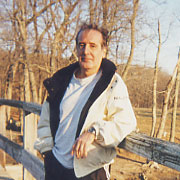War Poetry Contest 2002
Congratulations to the winners of our first poetry contest on the theme of war!
Third Prize $250
Richard Levine, The French Railroad at Quang Tri, Snapshots from a Battle, Mud-Walking
Honorable Mention $50
- Laurel Blossom, The Near Occasion of Sin
- Geoffrey Clay, To Home, Winter 1943
- Ginny Lowe Connors, Give Me Tomorrow
- Nicholas Green, The Homecoming
- Patti Patton, Sasha Returning
Finalists
- Steve Amick, The Animals
- Claire Braz-Valentine, An Open Letter to John Ashcroft, Attorney General of the United States
- Kathleen M. Conley, Killing a Gathering of Cells, Saving Angel
- Raphael Dagold, In Manhattan, After
- Elizabeth Howkins, The Devouring, Stalingrad
- Victor Lodato, Mother and Daughter with Apples and A Shoe
- Carolyn Moore, Spoils of War
- Dale Ritterbusch, Daisy Carbine Mantra
- Joanna Catherine Scott, Lying in the Dark
- C. Lynn Shaffer, War Story, River Around a Village
Thanks to everyone who entered our first War Poetry Contest. We received 712 entries of up to 3 poems each. I read everyone's poems anonymously, many of them several times, and was deeply moved. It was an honor to be entrusted with your stories. I worked hard to do them justice.
Criteria
I sought three qualities in a winning poem: original use of language, an engaging and nuanced story or message, and a poetic ear.
For language, I sought poems with rich and varied imagery, unusual yet apt metaphors, and a distinctive voice. Poetry by novices is often indistinguishable because of its reliance on stock images (e.g. angels, teardrops). Another hazard is to let the story overwhelm the lyric. Many engaging entries would have made great personal essays, but did not sound enough like poetry. A special hazard when writing about current events in poetry is to slip into the cliché-ridden idiom of the news magazines.
Compelling stories were many. Some told of combat or homefront hardships in World War II, Vietnam and the Persian Gulf; others brought to life Civil War battles and classical mythology. I regretfully passed on dozens of poems that told fascinating and raw tales of warfare because the verse needed more work. The poems whose subject matter fell short tended to be simplistic, with too much unreflective patriotism or ridicule of politicians.
The poetic ear was the most elusive trait. By "ear" I mean an ability to write with a poetic cadence - a combination of rhythms and sounds that is more lyrical than ordinary prose, but not sing-song or pretentious. For free verse, the danger was sounding too much like prose chopped up into short lines. With many of the formal poems, I admired their mastery of traditional rhyme and meter but the text itself was awkward, prosaic or clichéd.
Themes in the Poems
Most of the entrants told stories of battlefield horrors or wartime loss. While not all of these were anti-war, the view that the soldier's life is a noble calling was in the minority. Many poems juxtaposed the heroic doomed soldier and the corrupt politicians or negative social trends that caused the war. There were some poems that honored war as an instrument of justice, but many of these, particularly the September 11 poems, were disappointingly clichéd. Perhaps we are still too close to September 11 to avoid sentimentalism.
Overall, the novice poems - those showing less poetic training or familiarity with contemporary work - were more likely to celebrate patriotism and wartime valor, and less afraid to tell an emotional story that ended on an uplifting rather than a darkly ironic or despairing note. Our more learned poets could learn from them.
The Winners
All of the winners, honorable mentions and finalists showed a sophistication of ideas and a superior mastery of language and imagery. (I admit Claire Braz-Valentine's "An Open Letter to John Ashcroft" is no paragon of subtlety, but the "terrible ten-foot tin tittie" provided welcome comic relief.) At the semi-final stage, the challenge was how much to weight beautiful language as opposed to emotional richness or graphic storytelling. In the end, I leaned towards the latter factors. War is ugly. A preference for the pretty turn of phrase can feel emotionally dishonest, taming the experience and allowing us to hide from its evils.
Ned Condini's "1960-2002, A Testimony" had a cadence and sweep that reminded me of T.S. Eliot's "Four Quartets", one of my favorite poetic works. The haunting and lyrical last section, "January 2002", makes me shiver. Unlike many of the other entries, this poem did not leave the reader helpless before war, but convincingly offered a hope of redemption.
The same quality appealed to me in Charles Atkinson's "Rehab Journal", a disabled vet's journey from shock and bitterness to acceptance and a determination to love whatever life is left. "Because We Are Men" stood out because of its nuanced understanding of the needs war fulfills in the psyche. Rather than excoriating humanity for a fascination with violence, he acknowledges that "nothing, besides tumescence/ or death's husky whisper, brings a man so alive." All three of his winning poems show mastery of the music of language, the poetic ear.
Richard Levine's Vietnam War sequence - "The French Railroad at Quang Tri", "Snapshots from a Battle", and "Mud-Walking" - took me on a journey from which I emerged sadder and wiser, like the Ancient Mariner's companion. Its detail, at once realistic and hallucinatory, set the standard among the battlefield memoirs we received.
Thanks again to everyone who entered. So many entries showed promise. Keep writing!
Contest Judge

Jendi Reiter
Jendi Reiter is vice president of Winning Writers, editor of The Best Free Literary Contests, and oversees the Winning Writers literary contests. Jendi is the author of the novel Origin Story (Saddle Road Press, 2024), the short story collection An Incomplete List of My Wishes (Sunshot Press, 2018), the novel Two Natures (Saddle Road Press, 2016), the poetry collections Made Man (Little Red Tree Publishing, 2022), Bullies in Love (Little Red Tree Publishing, 2015), and A Talent for Sadness (Turning Point Books, 2003), and the award-winning poetry chapbooks Swallow (Amsterdam Press, 2009) and Barbie at 50 (Cervena Barva Press, 2010). Awards include a Massachusetts Cultural Council Artists' Grant for Poetry, the 2016 New Letters Prize for Fiction, the 2016 Rainbow Award for Best Gay Contemporary Fiction, the 2015 Wag's Revue Poetry Prize, the 2013 Little Red Tree International Poetry Prize, the 2012 Betsy Colquitt Award for Poetry from Descant magazine, the 2011 James Knudsen Editor's Prize in Fiction from Bayou Magazine, the 2011 OSA Enizagam Award for Fiction, the 2010 Anderbo Poetry Prize, and second prize in the 2010 Iowa Review Awards for Fiction. Jendi's work has appeared in Poetry, The New Criterion, Mudfish, Passages North, Cutthroat, Best American Poetry 1990, and many other publications. See their interviews in RoundPier and Lammergeier.
Photo by Ezra Autumn Wilde








